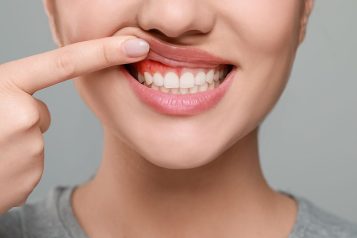Our dietary choices significantly affect our oral health, influencing the integrity of teeth and gums. Several common habits, including the consumption of acidic drinks, sugary treats, alcohol, and even seemingly harmless actions like chewing on ice or gum, can negatively impact our dental well-being.
 Photo Credit: Courtesy of Rido/Shutterstock
Photo Credit: Courtesy of Rido/Shutterstock
1. The Impact of Acidic Foods and Beverages on Tooth Enamel
Tooth enamel, the outermost layer of your teeth, is composed of about 95% minerals. This mineral-rich structure is highly susceptible to damage from acidic foods and beverages. When you consume items like citrus fruits, soda, or flavored sparkling water, the pH level in your mouth drops, creating an acidic environment. If your teeth remain in this environment for more than 20 minutes, the minerals in the enamel start to dissolve, softening the enamel. Over time, this leads to enamel thinning, causing teeth to appear gray and dull. Persistent consumption of low-pH foods and drinks can result in significant enamel erosion, ultimately breaking down the tooth structure.
2. Alcohol’s Role in Tooth Decay and Gum Disease
Frequent alcohol consumption poses serious risks to oral health. Alcohol not only creates an acidic environment in the mouth, leading to enamel erosion, but it also contains sugars that feed cavity-causing bacteria. Additionally, alcohol causes dry mouth, which is a breeding ground for harmful bacteria. A dry mouth, lacking the protective benefits of saliva, becomes more susceptible to cavities and gum disease, exacerbating the destructive effects of alcohol on oral health.
3. Oral Health Challenges in Vegetarian and Vegan Diets
Vegetarian and vegan diets, while healthy in many ways, can present unique challenges to oral health. The increased consumption of fiber-rich foods, uncooked vegetables, and seeds can lead to tooth fractures due to the constant chewing of tougher textures. Furthermore, the higher intake of fruits, which are often acidic, can contribute to enamel erosion. These diets may also lack certain vitamins and minerals crucial for maintaining strong teeth and gums, potentially increasing the risk of oral health issues.
4. The Risks of Chewing Ice
Chewing ice might seem harmless, but it can be quite detrimental to your teeth. The hardness of ice can lead to cracks in the teeth, which may eventually reach the root, necessitating a root canal or even resulting in tooth loss if the crack is severe. The risk of damage is even greater for those who chew ice regularly.
5. Chewing Gum: A Double-Edged Sword
Chewing sugar-free gum, especially varieties containing xylitol, can have protective effects on your teeth. Xylitol is known to weaken cavity-causing bacteria, and chewing xylitol gum for five minutes, five times a day for a year can potentially eliminate the risk of cavities. However, excessive gum chewing can lead to problems. Prolonged and frequent gum chewing can cause overdevelopment of the chewing muscles, which may result in jaw pain, headaches, and increased tooth fractures. Stronger chewing muscles can place more stress on the teeth, leading to issues like jaw clicking, pain, limited mouth opening, and even locked jaws.
Understanding the impact of dietary habits on your oral health is crucial for maintaining strong teeth and healthy gums. Moderation and mindful consumption of acidic and sugary foods, alcohol, and even gum can help preserve your smile. If you have specific dietary concerns, it’s always wise to consult with your dentist to ensure your oral health remains in optimal condition.
For any questions or to schedule a consultation, reach out to Union Square Dental Practice today to ensure your oral health remains in optimal condition.
For more information, visit Dr. Brian A. Levine's social media:

























